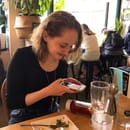This article has been written as part of a series in honor of National Coming Out Day, in collaboration with the Kutztown University LGBTQ+ Resource Center. National Coming Out Day exists because coming out is difficult, to put it mildly. Most LGBTQ+ people worry to some extent about negative reactions from loved ones, and many still fear workplace or housing discrimination. The aim of the series is to share stories of people with less represented identities or coming out stories and to foster the kind of understanding and compassion that can reduce that fear.
Rida is a 19-year-old college student from Toronto, Canada. We’ve been extremely close friends for about five years. When I first asked her how she identified, she said, “I don’t know if I’ve fully figured that part out yet. I think for now I’ve kind of just been saying enby, but I don’t have anything really specific there.” Enby is short for non-binary, an umbrella term for anyone who does not identify as either male or female. It can mean different things for different people. For Rida, “It means that I don’t really fully associate myself with the body I’m in, but I also don’t really associate myself with the other common option, and so I don’t really connect with gender or the gender binary in the way society has structured that for us.”
She later added that she also identifies as grey-asexual and biromantic. She can be romantically attracted to people of any gender, but her sexual orientation, like her gender identity, is nuanced. “The way I experience [sexual attraction] isn’t on par with the way most of the world does. It’s very infrequent, and when it does happen, it doesn’t last very long.”
Coming to terms with her identity was a long, gradual process. I was the first person she told she was non-binary because she’d arrived at that conclusion while we were talking on the phone months ago. “It was interesting because I definitely toyed with the idea for many, many, many years,” she said. She explained that it took her so long to figure out her gender identity because she’d had very little representation of non-binary people growing up, which led her to think, “Enby is just that trendy phase people go through when they can’t decide.” Once she realized that there were non-binary adults working white collar jobs like she aspires to, “I was like, oh, I can do that! That’s an option for me!” It also took her a long time to figure out that she was asexual, because she wasn’t sure if she was truly asexual or if it was just an effect of her clinical depression.
Coming out to others is a more anxiety-inducing experience for Rida. She explained to me that for her, deciding whether or not to come out is a matter of safety. “It’s nice to be accepted and feel like the rest of the world sees me the way I see myself, but that’s not always realistic. It’s not always necessarily a physical safety thing, but a lot of times the consequences of coming out just aren’t worth it.” She was “terrified” to come out to her boyfriend because she was worried that he would react negatively, and she still hasn’t come out to another friend because he’s repeatedly and knowingly misgendered his own non-binary sibling. Being rejected or misgendered may not always be physically unsafe, but it would still be emotionally damaging. Rida worries about managing how other people feel, and whether coming out could damage relationships if somebody is angry with her for not having come out sooner. Coming out as asexual is the most difficult for her, simply because people don’t tend to understand what she means. She actually told me she was asexual for the first time during our interview. Because we’ve been so close for so long and she knows I’m accepting, she wasn’t nervous at all, but she explained that if it had been anyone else, she would have started backpedaling.
While she has told some family friends that she’s biromantic and asexual, her family background has made coming out as non-binary more difficult since she comes from a conservative Muslim family. As a nonbinary person, her concern is not so much hostility as confusion. “I’d get a lot of backlash if I came out as a trans man, but coming out as non-binary, I don’t even think they’d know what that means, let alone be accepting of that.” Her advice to people who have just had someone come out to them and are confused is to “Be supportive. Be proud of them for coming out, because that’s really difficult. Do research, ask questions, put yourself out there, because in coming out, your friend already did.”
Her background also shifted the way she processed her identity internally. “I had a hard time with it when I was a child and still religious because there was a lot of, ‘Hey, God doesn’t make mistakes’ type deal,” she explained. “It made me a very angry child. I know there were moments where I felt like I didn’t belong, but I don’t think there was ever a question of, ‘Am I wrong about who I am and what I’m meant to be?’ I think I more struggled with, ‘Well, if this is who I am, do I have a place in this world?’” She said that she would tell her younger self, “I have a place in this world and that I will find it.”
That also sums up her advice to other young people like her: “Trust yourself. You’re okay and your identity is right. You’re doing the right thing, and if that means not coming out, then that’s okay. If you’re ready to come out, come out, and if you need to run, run. Whatever you believe is right is right, and nobody can tell you otherwise.”



